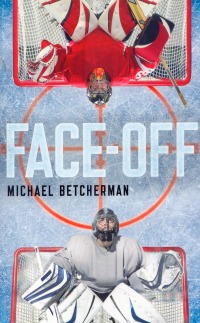| ________________
CM . . .
. Volume XX Number 39. . . .June 6, 2014
When boys are browsing the shelves of my school library looking for something good to read, it’s not always easy to recommend a novel for them if they’re looking for one that has sports and will keep them interested in other ways too. Face-off, a fast-paced novel by Michael Betcherman, meets their sports-content criteria and a lot more. Great hockey writing? Check. Mystery and suspense? Check. Adventure? Got it. These factors and others ensure a broad appeal and enthusiastic audience for this book. Face-off is the story of Alex, a 17-year-old goalie living in BC. Despite being a skilled high-level goalie with a possible American college scholarship in his future, he has problems with confidence (personified by the Voice, an inner critic that he sometimes has trouble silencing). Alex is an easy character to like and become attached to. He’s a talented but modest guy who laments the fact that he’s still a virgin. He still feels grief and anger over the loss of his father who was murdered in the war between Berovia and Maldania. Alex takes the reader along for a wild ride as he, his brother, and Lara—his best friend—try to track down two war criminals who may be hiding in B.C. Betcherman very diplomatically invented the nations involved in the conflict in which Alex’s dad was killed. He deliberately made the names and details evocative of the conflicts in the Balkans in the 1990s; however, Betcherman describes them as being “inspired by” the wars in the former Yugoslavia. As I began reading the novel, I thought this would be distracting, but, in the end, I believe it was quite cleverly done. Betcherman’s approach made the conflict more universal; thus, he can present the theme of the many impacts of ethnic strife without assigning blame to a particular nation. Even the snippets of Berovian language, also created by Betcherman, were integrated effectively into the novel. Through happenstance—at a hockey tournament in which Alex realizes an opposing goalie from Maldania is identical in appearance to him—Alex is reunited with his twin brother, Stefan.
Stefan’s existence had been kept a secret from Alex by his mother who presumed that Stefan had died in the same horrific event that had killed his dad. The boys are identical twins, and they soon discover that they share more than just similarities in their physical appearance. Both are goalies, and they have the same favourite player, Lou Roberts, the Vancouver Canucks’ goalie (a fictional figure who seems to have been inspired by the real-life Canucks’ goalie Roberto Luongo). Alex’s joy over finding his brother turns to jealousy after Stefan leaves Maldania and comes to live with Alex and his mom. The brothers experience a sibling rivalry compounded by being star goalies for opposing teams in the same league. Also, it’s tough for Alex to share his mom after so many years of having her to himself. Betcherman presents some strong messages in the novel about brotherhood and the power of working together as a team. Several other storylines are introduced early in the novel, and Betcherman balances them well. For example, Alex’s friendship with Lara eventually becomes romantic. Their March Break trip to Berovia sans chaperones seems a bit convenient, but it creates the opportunity for their relationship to become physical. There’s also a realistic bully/bystander storyline that deals with the damage that can be caused by the hockey locker-room code of silence. Over the course of the novel, Alex overcomes his insecurity and frustration (the loss of “his mojo”) and gradually gains confidence in himself. This is linked to his quest for the truth about his father, as well as justice—not revenge—for his father’s death. He attempts to unravel the mystery of whether his Berovian uncle and co-worker are involved in hiding two Berovian war criminals. These dangerous men, known by their nicknames, the Stork and the Snowman, are responsible for the massacre in which Alex and Stefan’s father died. Betcherman packs a lot into the novel’s ending where his experience as a writer for television seems most obvious to the reader. Every moment can be easily pictured as it plays out. Although Betcherman relies heavily on coincidence to keep the plot going, his style is highly entertaining. Ultimately, Face-off is an engrossing blend of sports story and mystery/adventure novel. Readers will find themselves cheering for Alex in all areas of his life, not just in the goalie crease. Face-off is only Betcherman’s second young adult novel, with Breakaway being his first, and I have high hopes that he will continue to explore the genre using his terrific hybrid of sports writing and mystery. Highly Recommended. Gillian Lapenskie is a teacher-librarian at Barrie Central Collegiate in Barrie, ON.
To comment
on this title or this review, send mail to cm@umanitoba.ca.
Copyright © the Manitoba Library Association. Reproduction for personal
use is permitted only if this copyright notice is maintained. Any
other reproduction is prohibited without permission.
NEXT REVIEW |
TABLE OF CONTENTS FOR THIS ISSUE
- June 6, 2014.
AUTHORS |
TITLES |
MEDIA REVIEWS |
PROFILES |
BACK ISSUES |
SEARCH |
CMARCHIVE |
HOME |
